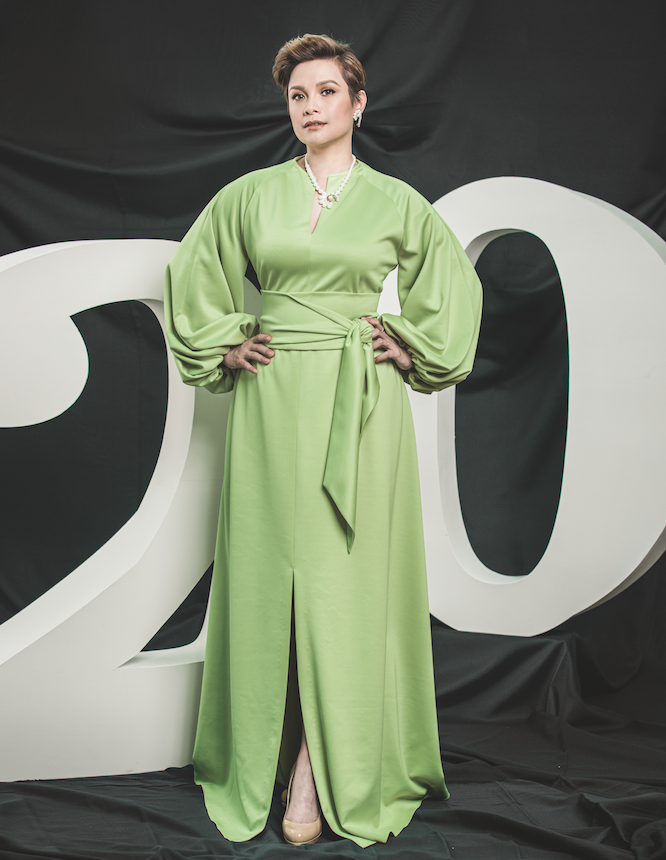 At nine, she played the title role in Annie. At 18, she was the face of Miss Saigon as the original Kim. In between her portrayal of Annie and Kim, she searched for perfection. Later on, she would score a Lawrence Olivier award (1990) and a Tony award (1991) for her excellent performance in Miss Saigon. If excellence had a name, it would be called Lea Salonga.
At nine, she played the title role in Annie. At 18, she was the face of Miss Saigon as the original Kim. In between her portrayal of Annie and Kim, she searched for perfection. Later on, she would score a Lawrence Olivier award (1990) and a Tony award (1991) for her excellent performance in Miss Saigon. If excellence had a name, it would be called Lea Salonga.
Lea, without a single molecule of doubt, is an international star. Filipinos have dubbed her as a national treasure—for the sterling clarity of her voice, her passion for perfecting her craft and for the honor she brings to the Philippines as an excellent artist.
Her exceptionality can be gleaned from the following fast facts: Lea is hailed as a Disney Legend (2011), great thanks to her lending her voices to Disney productions of Aladdin (as Princess Jasmine, 1992) and Mulan (as Fa Mulan, 1998). That was a big leap from her bubble-gummy appearance in That’s Entertainment, a local variety show that launched many a career of big stars now in the country. Lea is quick to acknowledge the importance of That’s Entertainment in her life—“it was a big help!”
Lea was also named as one of the “50 Most Beautiful People in the World” by People magazine in 1991. She was also the first Filipino artist who had an international label with Atlantic Records in 1993. In the same year, she became the first Asian to play Eponine in Les Miserables on Broadway. She likewise essayed the role of Fantine. She was also appointed as the Goodwill Ambassador for Food and Agriculture Organization of the UN in 2010.
Critics from the Philippines and Singapore recently hailed her for her funny, witty and naughty portrayal of Mrs. Lovett in Sweeney Todd: The Demon Barber of Fleet Street. She has the gift of telling a story with her crystal-clear voice, her signature as an artist.
Even at an early age, the spotlight has always been on Lea. “I started to sing at four. One of the first songs I remember singing then was We May Never Love Like This Again by Maureen McGovern.” She sang that song while holding on to a plug, pretending it was her microphone.
Her stardom, not a birthright but a product of her constant search for her own luminosity, is still burning brightly now. Bonus it is that, as she notices, her vocal range has gone higher as she ages. It is expected as Lea does not only sing, she’s a musician, too. She understands music by heart. At an early age, she did her homework in understanding musical theories and techniques.
“There were these Saturday extension classes in UP when I was a child. I remember taking a test on music theory to see where they could slot me. What level I was at. I know my crescendo, my decrescendo. I know my dynamics. I know what a musical director will ask of me. If they say ‘can you start at mezzo piano?’ I know already what that means and it’s up to me now as an artist to navigate from Point A to Point B given the instruction of a musical director. They didn’t have to break everything down so much,” she explains.
When Lea records songs, she does not rely on Autotune or Melodyne, a software for pitch correction. She has a natural, God-given perfect pitch. Her high notes bring audiences to dreamland; her low notes are reached with the lucidity of an artist who knows herself, her song, her music, her heart, her art.
Home is where the heart is
Her heart and art were nourished at home. She has a hero called Ligaya Salonga, her mother who, with ultimate joy in her soul and clear vision in her mind, recorded her four-year-old daughter singing We May Never Love Like This Again. From then on, Ligaya and Lea have become a formidable tandem.
“My mom is indefatigable. She has more energy than my brother Gerard and I combined — what we do is very physically demanding. But she’s indefatigable and people knew how old she is. She’s 82 as far as we know,” Lea says of her mother who remains sharp and witty to this day.
Ligaya is a very loving mom. Every weekend, during the Philippine run of Sweeney Todd, she cooked and brought food backstage for Lea and her co-stars to enjoy. Then, she packed the dishes to bring home with her.
Ligaya says the artistry of Lea is from her genes, her being smart, from her dad’s. Up until she was six years old, Lea grew up in Pampanga, where her father, the late SBMA chairman Feliciano Salonga, was from.
Her father was a product of public school education, back when public school education was still something. He was sent to college on a government scholarship to the US Merchant Marine Academy in Long Island, New York where he was Top 3 in his class. “My father was extremely well-versed in English, Tagalog and Kapampangan. I think he could also speak some functional Japanese, which he used for business. He did not like it when Gerard and I mix two languages. If it’s English, English. If it’s Tagalog, Tagalog.
Lea spoke highly of her late father. “The best lesson I learned from him is that he was incorruptible when it came to money. Hindi siya nagnakaw (He didn’t steal). He was a mechanical engineer by education. He was a merchant marine who was into commercial shipping. He was always working with ship lines and dry docks. Those are the things I would always hear.”
Lea is an obedient child. How is she as wife to Robert Charles Chien, a businessman involved in real estate? How does she mother their 13-year-old daughter Nicole?
When Robert met Lea
“I’m not the best homemaker. My husband’s far better at it than I am,” she laughs. Lea and Robert met in Los Angeles, California while she was doing Flower Drum Song. His cousin, who was part of the musical, introduced him to Lea. The first two times they were introduced went to naught. The third time was the charm—for they went out and spent hours on their first date. They have been together for 18 years now.
“My husband is pretty flexible with his time, which is great, for when I travel, there’s always somebody home for Nicole. She’s 13 and she’s another one who really expresses herself very eloquently when she speaks.”
Lea says Nicole is not into the trappings of a celebrity. “She’s not into the autograph. She’s not into being famous. Not into that. She wants to do her work. She wants to be in theater, but she doesn’t care to be a celebrity. That’s absolutely fine with me. It should always be about the work. It shouldn’t be about being famous.”
With both family and career on her plate, how does she manage to be at the top of her game?
“For me it’s more of trying to consistently do good work at the end of the day; that’s what it’s going to boil down to. For as long as audiences are responding to me and for as long as they come and see what I do. I guess that’s it. I don’t think about staying on top. It’s weird to think about it that way. I just do my job. I try to do well and let the chips fall where they be,” adds Lea, who is also a coach in The Voice Philippines.
Lea Salonga is in her best form—at home and in her job. Her schedule for 2020 is jam-packed. She’s not complaining. Far, far from that. She sees it with 20/20 vision: it’s a blessing to remain relevant in the industry that she loves and loves her back.





